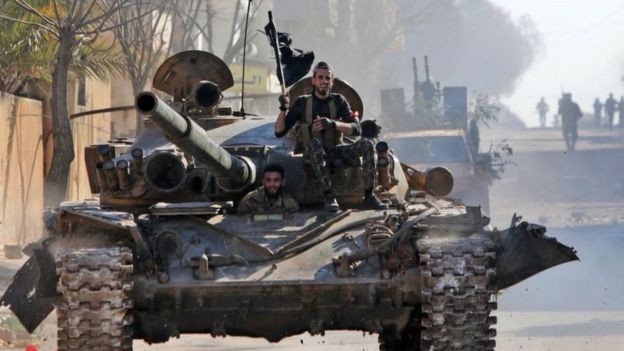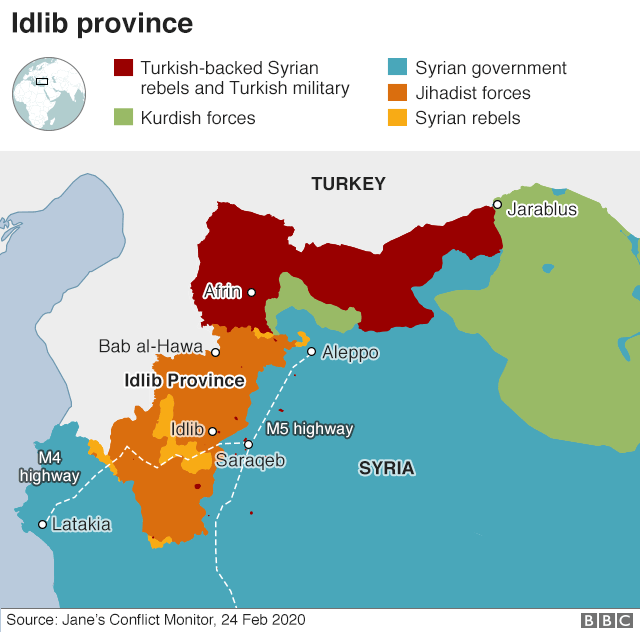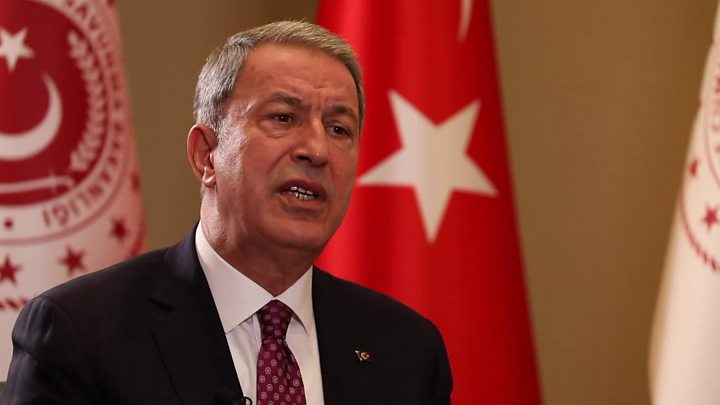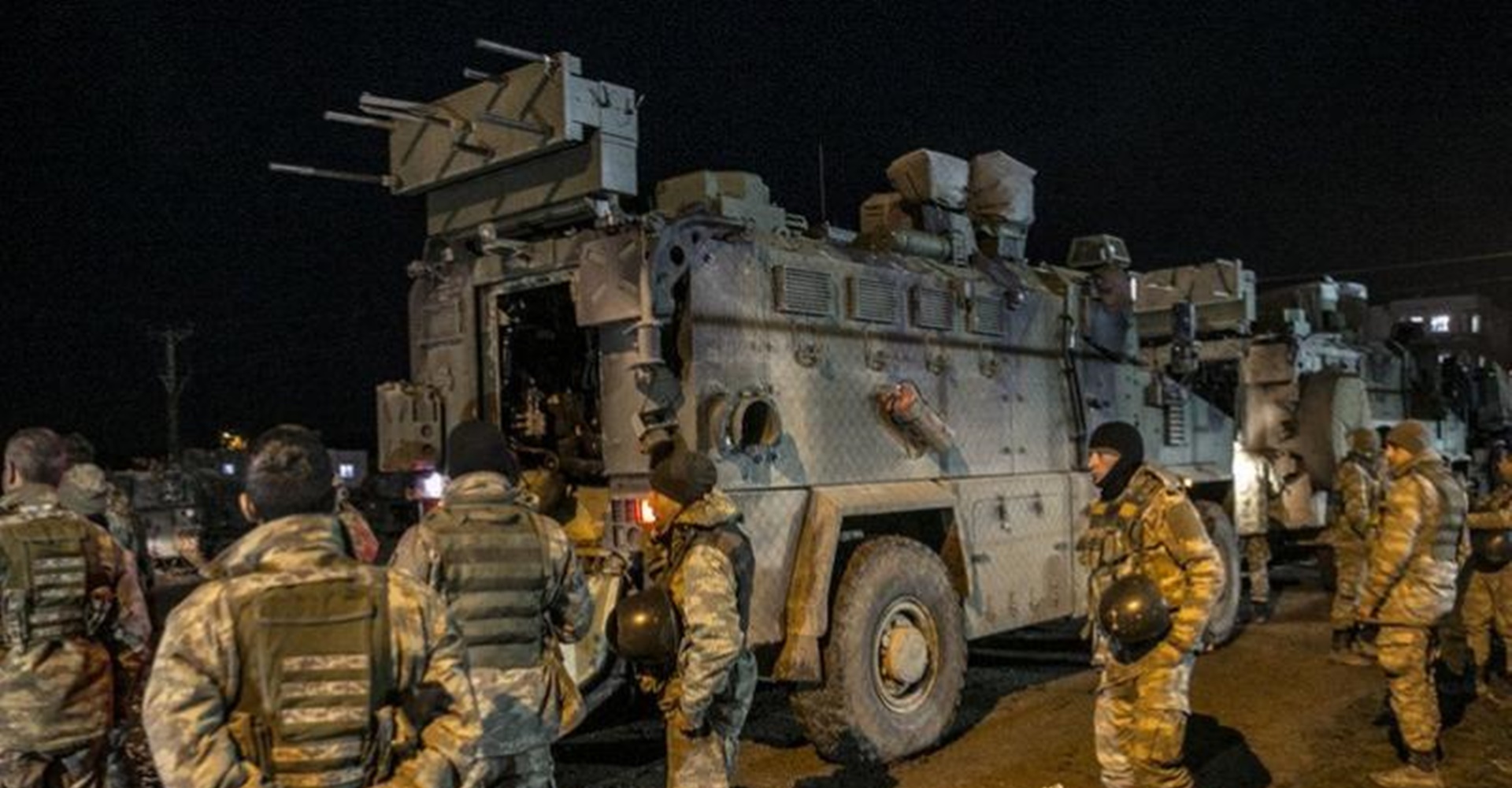At least 33 Turkish soldiers have died in a Syrian government attack in opposition-held north-western Syria, in a major escalation of the conflict. Turkey, which backs the opposition, says it hit 200 government targets in response, “neutralising” 309 soldiers.
Russia, Syria’s key military ally, says Turkish troops were attacked in Idlib province by Syrian forces while operating alongside jihadist fighters.
The EU has warned the crisis could escalate further.
“There is a risk of sliding into a major open international military confrontation,” EU foreign policy chief Josep Borrell tweeted. “It is also causing unbearable humanitarian suffering and putting civilians in danger.”
- Why does the battle for Idlib matter?
- Forgotten amid the bombs: Idlib’s ancient riches
- The rescue worker who won’t leave a bombed-out town
- The town with more cats than people
How is Turkey reacting?
The Turkish and Russian presidents spoke by phone on Friday. Recep Tayyip Erdogan and Vladimir Putin both expressed concern and agreed on the need for “additional measures” to normalise the situation, with the possibility of a summit in the near future, the Kremlin says.
Russian and Turkish officials are due to meet at the Turkish foreign ministry. Russia also says top Russian and US military officials have discussed the situation in Idlib.
Russia denies its own forces were involved in the fighting in the Balyun area.
Government forces, supported by Russia, have been trying to retake Idlib from jihadist groups and Turkish-backed rebel factions based there. The attack came after Turkish-backed rebels retook the key town of Saraqeb, north-east of Balyun. Idlib is the last Syrian province where Syrian rebel groups still control significant territory.
Meanwhile, Turkey says it is opening its western land and sea borders so some of the millions of refugees and migrants it hosts can travel onwards towards Europe.
Turkey’s communications director Fahrettin Altun said the migrants were now also Europe and the world’s problem. He said Turkey had “no choice” but to relax border controls because it had not received enough support in hosting about 3.7 million Syrian refugees, Reuters reported.
Mr Altun had earlier said Turkey did not have the capacity to allow entry to the nearly 1 million Syrians fleeing the fighting in Idlib. He called for the international community to protect civilians in Idlib from “genocide” by imposing a no-fly zone.
What do we know about the attack?
“Thirty-three of our soldiers were martyred as a result of the air strike… by the forces of the [Bashar al-] Assad regime,” said Rahmi Dogan, the governor of Turkey’s neighbouring Hatay province.
 Image copyrightAFP/GETTY IMAGES
Image copyrightAFP/GETTY IMAGESAfter President Erdogan held an urgent top-level security meeting in Ankara, Turkish forces began conducting ground and air strikes.
Defence Minister Hulusi Akar said that in addition to the casualties inflicted, five Syrian government helicopters, 23 tanks, 23 howitzers, and two air defence systems had been destroyed.


According to the Russian defence ministry, the Turkish soldiers had been killed in a “bombardment” while operating alongside “terrorists” in the Balyun area where, it said, fighters from the Hayat Tahrir al-Sham alliance (formerly the Nusra Front) were attacking Syrian government forces.
Russia said it was in constant contact with Turkey to ensure Turkish troops were not targeted in Idlib and had not been informed that Turkish forces were active at Balyun.
But Mr Akar insisted the Russians had been informed about the locations of Turkish troops and said no armed groups had been present near the soldiers who were attacked. He also said ambulances had been hit in the attack.
Two Russian warships equipped with cruise missiles have passed through Istanbul’s Bosphorus Strait on their way to the Syrian coast.

President Erdogan wants Syrian government forces to pull back from positions where Turkey has set up military observation posts and earlier threatened to attack them if they did not halt their advance.
But Syria’s government and Russia have rejected his demand to pull back to ceasefire lines agreed in 2018. Russia has also accused Turkey of violating the 2018 ceasefire by backing rebels with artillery fire.
bbc.com / balkantimes.press
Napomena o autorskim pravima: Dozvoljeno preuzimanje sadržaja isključivo uz navođenje linka prema stranici našeg portala sa koje je sadržaj preuzet. Stavovi izraženi u ovom tekstu autorovi su i ne odražavaju nužno uredničku politiku The Balkantimes Press.
Copyright Notice: It is allowed to download the content only by providing a link to the page of our portal from which the content was downloaded. The views expressed in this text are those of the authors and do not necessarily reflect the editorial policies of The Balkantimes Press.

